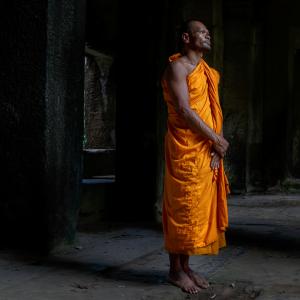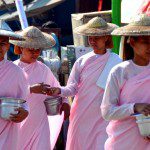A difficulty I encounter time and time again when teaching Buddhism or talking about it with friends is the “myth of Buddhist pacifism” and the idea that Buddhists aren’t engaged in politics or worldly matters. As a scholar of comparative religious ethics – looking largely at texts written by elite groups and individuals – I see the side of Buddhism which is, to an extent, “other-worldly” (to use Weber’s category). However, as a scholar of Buddhism as it is lived in the world, with a focus on Buddhism in the West / 20th Century global Buddhism, I cannot deny that Buddhists have had a wide array of very “this-worldly” interests and activities.
Reading and speaking with scholars of Buddhism in different times and places, I have no doubt that Buddhists have always had “this-worldly” interests. However, this is not the alluring part of Buddhism to most in the West; instead the interest is the soteriology, the goal of an “other-worldly” nirvana (or at least a meditative reprieve from the chaos of 20th-21st century society). For most of us in the modernized world (myself included most of the time), Buddhism isn’t composed of Buddhists, but of ideas and practices that can be discussed, debated, understood, and practiced.

However, it is important to never lose sight of those Buddhists who have carried on the ideas and practices we cherish. Some of those Buddhists were also violent, some have been sexual predators, some Communists, some capitalist entrepreneurs, some monks, some laypeople, and so on.
So Amar Diwakar’s recent article in the New Republic is important reading.
The article is essentially a review of Eugene Ford’s book, Cold War Monks: Buddhism and America’s Secret Strategy in Southeast Asia. As Diwakar writes:
Buddhism and statecraft have long been joined at the hip. The religion supplied the symbols of kingship in courts, capitals, and urban centers from Burma (now Myanmar) to Siam (Thailand) to Laos, as monastic orders and ruling elites forged intimate ties. Following the seventeenth century, European imperialism disrupted the symbiosis of religion and state in places where colonial regimes were installed. By the early half of the twentieth century, anti-colonial movements saw monks participate in dissent, laying the foundations for the clergy to enter secular affairs.
While the book looks primarily at the use of Buddhism (and Buddhists) to attack Communism and kill Communists in the 20th century, Diwakar astutely points to the late 20th/early 21st century pivot from Communism as enemy of the day to Islam, writing that “This ideological shift just so happens to coincide with the U.S.’s “war on terror,” which has been operationalized to justify the bloody reprisals in Thailand and the pogroms in Myanmar. And the monks are front and center of it all.” Just as right-wing Buddhists attacked Communism as the great evil then, we see Islam pointed at as existential threat to Buddhism today.
Then, in Thailand:
… Kittivudho Bhikkhu in an interview in late June 1976, [] argued that while all killing involved some demerit for Buddhists, killing communists in protecting nation, religion and monarchy was killing bestial types rather than humans and he stated that “Buddhists must do it [kill communists].” [read more]
Now, in Burma (Myanmar):
Wirathu has also pushed a ban against interfaith marriage, claiming that the Buddhist majority is diluted by such marriages and reeling off one anecdote after another of forced conversions of Buddhist women to Islam. Many critics here and abroad say Wirathu’s sermons are racist rants against Muslims who he has likened to “mad dogs” and “cannibals” …” [read more]
To be fair, of course, there are monastics on the other side in each country and each conflict.
Bhikkhu Subhuti, an American-born monk in Myanmar today wrote 3 years ago of his work to bring Buddhist and Muslim communities together there. And many worked to engage in a politically active middle-way. The well known Thai monk Bhikkhu Buddhadāsa pushed a form of what he called Dharmic socialism. As Santikaro writes, “The term “Dhammic Socialism” was coined by Ajahn Buddhadāsa in the late 1960s in response to the growing political polarization in Southeast Asia.” And in Sri Lanka earlier this month many monks came out to denounce the spread of anti-Muslim violence there. Lastly, the Dalai Lama (not discussed here because he is outside the geographic scope of the book), who lost his country to communist invasion, has been a strong advocate of talks across economic ideological divides as well as interfaith understanding and dialogue.
The important thing is not to malign Buddhism – as Communism long has been and Islam is so much today – but to see the religion, in its people at least, as they truly are: diverse in their political activities, economic ideologies, and other this-worldly interests.
Support independent coverage of Buddhism by joining a community of fellow learners/practitioners at Patreon.
‘Like’ American Buddhist Perspectives on facebook.












